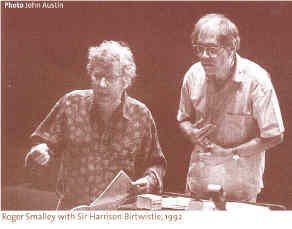

 |
 |
|

ROGER SMALLEY AT 60 Trinity
College of Music, Old Royal Naval College, Greenwich, London SE10
9JF, 19/22 May 2003 "You remember Roger Smalley, don't you?" Prominent on the UK new music scene, and highly rated in London around the '60s & '70s, Roger Smalley (b. 1943, near Manchester) moved to Western Australia and disappeared from regular notice in UK. A brief residency at Trinity College of Music in Greenwich gives a welcome opportunity to re-appraise his music.
In an interview for the New Quays series with one of the Trinity students, Roger Smalley explained that in Australia he didn't encounter so many composers with new ideas, so his own music became less adventurous, and for ten years has been 'pretty much based on Chopin, Liszt and Brahms'. 'Finding the new within the old' has been an underlying force in Roger Smalley's later output since transplanting himself into 'Australia's cultural and spiritual landscape' which, it is claimed, has managed 'to conjure up his love of the great classics within a radical musical perspective'. To open the New Quays session, Roger Smalley played two Chopin mazurkas before his own twelve Chopin Variations (1989) upon one of them. His association with Stockhausen was recalled by playing Piano Piece No. IX, the best known of the ground breaking series, now numbering 17. He explained how its alternation of regularity and irregularity is all derived from the Fibonacci series, 'which explains everything'. After Smalley's half-hour there was a very mixed bag of student performances, followed by open discussion led by Elena Riu. Recital of Roger Smalley's music:
The Continuum Ensemble/Douglas Finch This was a stimulating, and well attended, lunchtime recital, given en route to the recording studio next month (NMC). We heard consummate performances of three chamber pieces introduced by Douglas Finch, who played also a Chopin Mazurka and a Brahms intermezzo, which had provided the launchpads for Smalley's formal developments. Lasting 1¼ hrs without an interval or requiring one, the programme was perfectly conceived and I hope will be replicated exactly as heard. Trinity College's Contemporary
Music Ensemble/Diego Masson This well planned evening concert, mostly of music
with a strong jazz influence was another typically entertaining
and rewarding Trinity College event. Roger Smalley's Cello Concerto (1985-96) - begun after his piano concerto* but not completed, recast for ensemble of 17, until ten years later - was, however, something of an odd man out in this context. It was conceived to 'gradually rise from lowest to highest register', but suffered at the from its inconsiderate instrumentation, with dense wind often smothering the cello, until a final adagio section derived from Schumann's Humoresque allowed Hyun Jung Kim to play cantabile. With the assistance of balance engineers, it would probably work well on broadcast or CD. Perfect calculation of precise effects made Stravinsky's Ebony Concerto (clarinet soloist Charlotte Self) the most effective and successful item. It was good to finish with Milhaud's The Creation du Monde, a famous jazz-influenced work from the '20s not heard nowadays as often as it deserves. It has been quite a Milhaud month, with his Octet, assembled from its constituent string quartets, a particularly memorable event at Purcell Room. A similar fate to that of Smalley's cello concerto had jeopardised Milhaud's opera Le Pauvre Matelot at BAC Opera in Battersea a couple of nights before. A neat morality tale about a returning sailor who unwisely tested his wife's fidelity incognito, he ended up being murdered by her to rescue the family from poverty. Not one of his most inspired creations, the singers were overwhelmed by the large chamber orchestra in the BAC Studio 1. It could only work with an orchestra pit; once again Stravinsky showed how to do it with his The Soldier's Tale, another morality about greed and the pursuit of money turning sour, looking well and sounding clear there. I expect The Poor Sailor had gone well in run-through with piano and in prospect it promised to be a good double bill. It proved not so; match between musical work and venue can be so crucial. Peter Grahame Woolf *See MusicWeb's review of Roger Smalley's Symphony and Piano Concerto on CD "You remember Roger Smalley, don't you?"
|